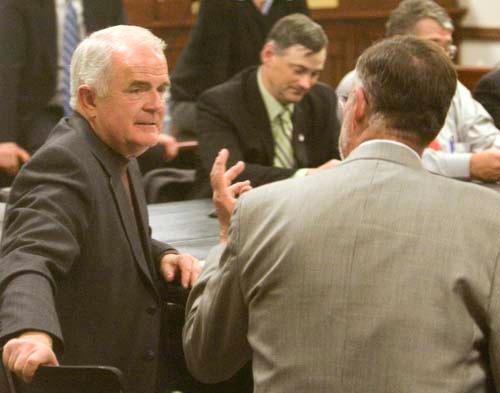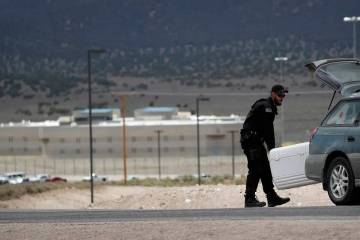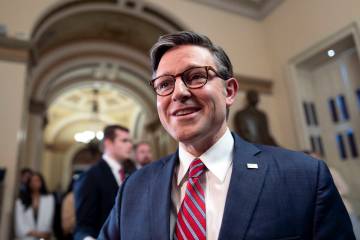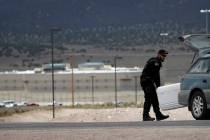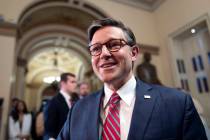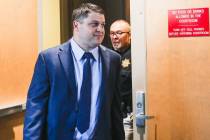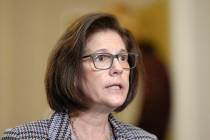Lawmakers, Gibbons agree to budget deal that would cut education by 6.9 percent
By LAURA MYERS, ED VOGEL
and BENJAMIN SPILLMAN
LAS VEGAS REVIEW-JOURNAL
CARSON CITY -- State spending on education would be cut by 6.9 percent under a budget deal Democrats and Republicans reached late Saturday, a source who had seen the draft budget document said.
The extra revenue would come mostly from the mining and banking industries. Casinos would not have to pay any new taxes or fees, but new licensees would be charged for investigations, according to the document. The gaming industry had strongly objected to paying any more money because of economic hard times.
The deal does not include a last-minute Republican Assembly idea to essentially allow private investors to buy unclaimed property the state collects, the source who saw the document said.
Members of the political party caucuses still must agree to the plan, which is part of an effort to close an $887 million budget gap and which could be approved at the special session as soon as today.
The deal, which is expected to mean pay cuts for teachers, was reached after five meetings over three days among legislative leaders and Gov. Jim Gibbons on Day 5 of the special session.
State workers fared better when, earlier in the day, the Assembly rejected further cuts to their pay but increased classroom sizes for Nevada's youngest pupils and closed many state offices on Fridays.
Senate Minority Leader Bill Raggio, R-Reno, said he thought the Republican governor would sign off on the deal.
"I commend the governor for working with us," Raggio said. "You would have to ask him how he feels about it, but we would not be taking it to our caucuses if we didn't feel we had an agreement."
According to one person in the Republican caucus meeting with Gibbons, the governor said he would sign the budget bill. But he wanted assurances that Republican legislators would stay united on the terms and not give any more concessions to the Democrats.
A source who saw the document said it contains $25 million in mining claim fees divided in three tiers to protect smaller mining companies from being hurt. The state is counting on an extra $62 million from mining in higher-than-expected tax on net proceeds.
The source said there was no new revenue contribution from the gaming industry, but the state expects to collect $4.2 million in a new investigation fees charged to gaming license seekers.
And banks would have to pay a fee when they foreclose on a home, raising $13 million to $14 million, said a second source who saw the draft budget document.
The document contained about $200 million in fund sweeps from state agencies and $100 million in federal money.
Not included was a proposal to seek tens of millions of dollars up front from investors in exchange for pledging a part of revenue from the state's unclaimed property fund, the source said.
For most of the day, Gibbons and lawmakers had inched tortuously toward a possible budget deal, slowed by what his staff called "speed bumps" and what Democrats saw as philosophical differences regarding how to raise revenue to reduce education spending cuts.
The Democrats wanted to tap new mining, gaming and banking revenue, while Republicans balked without industry approval. There was also the dispute about whether the state should adopt the GOP idea to let private investors pay for the rights to unclaimed property.
On education, Gibbons had proposed a 10 percent cut in state spending on kindergarten through 12th grade and higher education for a potential savings of $250 million. Democrats were pushing for a 5 percent reduction.
Earlier, the Assembly rejected any additional salary cuts for state workers but increased classroom size temporarily for Nevada's youngest pupils and also shut many state office buildings on Fridays. The plan still must be approved by the Senate. And the governor must sign off on any bill.
"Employee salaries have been cut enough," said Assembly Majority Leader John Oceguera, D-Las Vegas. "Our state employees took an 11 percent hit in pay and benefits last spring. Like other Nevadans, many of them are struggling to buy clothes for their kids, pay the mortgage and buy groceries."
Under the four-day workweek plan, most state employees would work 7 a.m. to 6 p.m. Monday through Thursday. Prison employees would work 12-hour shifts of three days one week and four days the next. Some employees at universities and colleges would work 10-hour days Monday through Thursday and others Tuesday through Friday.
In asking legislators to approve a four-day work schedule, Gibbons estimated the savings would be $12 million, $5.3 million from lower utility costs and the remainder from salary savings.
Senate Bill 3 calls for employees to take one unpaid furlough day each month. Gibbons wanted them to take a 10-hour furlough day off each month, equivalent to a 5.75 percent salary cut.
But Assembly members rejected the furlough, saying they have found enough money to keep the salary cut at 4.6 percent per employee, the rate that has been in effect since July. Employees still would take a day off each month, but their salary reduction would not be increased.
"This what the employees themselves wanted," said Gibbons Chief of Staff Robin Reedy about the four-day week plan.
Assemblyman Lynn Stewart, R-Henderson, said legislators found $6.8 million needed to prevent any increase in salary reductions.
Day 5 of the special session felt much like Day 4 and Day 3 when it came to closed-door talks among Democratic leaders of the Senate and Assembly, minority Republicans and Gibbons, whose sudden engagement contrasts with his distant veto pen policy in past years.
Democrats worked from the start of the special session to reduce the education cuts and raise revenues with fees on industries such as mining, gaming and banks.
The governor and most Republicans didn't want to impose fees on industries unless business leaders agree, equating such new fees with taxes, which would violate Gibbons' no new tax pledge in an election year when he's running behind in the polls.
The governor and his staff met twice Saturday with legislative leaders for a total five times over the past three days and emerged each time proclaiming the deal one step nearer to being done.
Assembly Speaker Barbara Buckley, D-Las Vegas, came out of the second Saturday night meeting of several hours with a one-word update: "Centimeters," she said of how close they were to a deal.
The last few inches or centimeters proved the hardest as the Republican governor and Democratic-led Senate and Assembly attempted to bridge the wide political gap along with the budget gap.
Democrats said they have the votes to pass a veto-proof budget plan that could get a two-thirds vote in both houses, including the Senate, where two of nine Republicans would have to join the 12 Democrats. The Democrat-Republican makeup in the Assembly is 28-14, a veto-proof count if all Democrats stay in line as expected. "I can assure you there won't just be two" Republican votes for any Democrat-crafted plan, said Sen. Randolph Townsend, R-Reno.
Senate Majority Leader Steven Horsford, D-Las Vegas, pushed hard and lost on trying to get the gaming industry to contribute extra revenue.
In the face of strong industry resistance, Gibbons and most Republicans argued against a plan to charge casinos fees to cover the $32 million-a-year cost of the Gaming Control Board regulatory agency.
Contact reporter Laura Myers at lmyers@reviewjournal.com or 702-387-2919. Contact reporter Benjamin Spillman at bspillman@reviewjournal.com or 702-477-3861. Contact Capital Bureau Chief Ed Vogel at evogel@reviewjournal.com or 775-687-3901.



